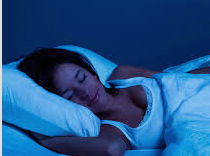Want more A’s? Get more Zzzz’s
November 24, 2015
For many 18-22 aged college students sleep is towards the bottom of priorities and is often the first thing to get neglected. Students have classes, homework, sports teams, work, Greek life, social lives and many other commitments that come before sleep! However, according to the National Sleep Foundation sleep is as vital as the air we breathe, the water we drink and the food we eat. It is recommended that collaged aged students get 7-9 hours of sleep per night but the average college student only gets 6-7 hours. Lack of sleep can seriously impact your health, mood, GPA and safety. You are not only more likely to fall asleep in your 8am classes you are also more likely to do worse on exams. Therefore before you choose to pull an ‘all-nighter’ studying for that final exam, or have a few drinks with your friends when you have work at 7am the next day, think about the unhealthy extra strains you are putting on your body and mind. After a goods night sleep you are more likely to be able to concentrate better, problem solve more efficiently and increase your memory therefore assisting in your ability to gain an A on that big final exam!
Negative Effects
- Lower your GPA. Including your ability to learn, listen, concentrate and solve problems.
- Break out in pimples. Lack of sleep can contribute to acne and other skin problems.
- Mood swings. Can lead to aggressive or inappropriate behavior such as yelling at your friends or being impatient with your teachers or family members.
- Weight gain. Can cause you to eat too much or eat unhealthy foods like sweets and fried foods.
- Illness. Increases your chances of getting a cold or flu due to a weaker immune system.
- Dangerous activities. Increases the chance of injury due to not using equipment safely or driving drowsy.
NOT so fun fact
When you are sleep deprived, you are as impaired as driving with a blood alcohol content of .08%, which is illegal for drivers in many states. Drowsy driving causes over 100,000 crashes each year. Recognize sleep deprivation and call someone else for a ride.
Only sleep can save you!
Sleep Disorders
Narcolepsy – Tendency to fall asleep during day time hours and falling immediately into a deep REM sleep. There is no cure but can be controlled using medicine.
Insomnia – Lack of quality and quantity of sleep. Treated by determining the cause of the problem and then changing your habits.
Restless legs syndrome – Having a strong urge to move your legs after going to bed causing problems falling asleep and waking up often. Treated by lifestyle changes and medicine.
Sleep apnea – When you stop breathing during your sleep repeatedly during the night. Treated by changing your lifestyle and wearing an oxygen mask during sleep.
Solutions
- Make sleep a priority. Keep a sleep diary.
- Nap smart! No more than 1 hour or after 3pm
- Make your room a sleep heaven. Keep it cool, dark and quiet.
- Your bed is only for sleeping. No studying or watching TV.
- Establish a routine. Try to go to bed and wake up every day around the same time.
- Don’t sleep in all weekend. This can shock your body and negativity effect your routine.
- Turn it off! Avoid TVs, computers and phones.
- Try taking a bath or reading a book just before bed to relax the mind and body.
- Keep a ‘to do’ list. So you don’t stay up all night worrying or stressing.
- Eat a little snack. Don’t eat too much before bed but have a little snack so your not hungry.
- Do some sort of physical activity throughout the day but try to avoid exercise just before bed.

Resources
https://www.uhs.uga.edu/documents/Sleep-Diary.pdf – Sleep Diary Example
https://www.youtube.com/watch?v=xQ6xgDI7Whc – Music to help you sleep!
http://www.sleepeducation.org/find-a-facility – Find your closest Sleep Facility
714 N. Senate Avenue
Suite 110
Indianapolis, IN, 46202
Phone: (317) 962-5710
Butler Health Services
HRC, Room 110
530 W. 49th St.
Indianapolis, IN 46208
Main Phone: 317-940-9385
References
https://sleepfoundation.org/sleep-topics/teens-and-sleep
http://www.aasmnet.org/articles.aspx?id=659
http://campusmindworks.org/students/self_care/sleep.asp
https://www.uhs.uga.edu/sleep/
http://www.helpguide.org/articles/sleep/sleep-disorders-and-sleeping-problems.htm
https://www.youtube.com/watch?v=3eLfn7Ewx_s – video


Leave a Reply